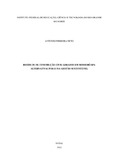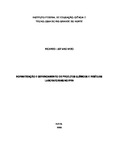Avaliação da gestão de resíduos sólidos em municípios do Seridó Potiguar

Visualizar/
Data
2019-08-30Autor
Souto, Vladimir Sérgio de Aquino
http://lattes.cnpq.br/0392804756273996
Metadado
Mostrar registro completoResumo
This study was carried out with the objective of evaluating solid waste management in municipalities of the Seridó region of Rio Grande do Norte, as well as to verify the adequacy of the methodology called the Updated Waste Management Condition Index (ICGRA) for the studied municipalities. ICGRA was developed by indicators grouped into four items: system characteristics, system planning, operating conditions, and management alignment with the National Solid Waste Policy and modern waste management techniques. The methodological procedure of the study was performed by applying the ICGRA spreadsheet to each of the municipalities studied, with field visits to survey the municipalities, interviews with managers responsible for solid waste management, consultations with available publications, legislation and regulations, and existing plans. The study selected 14 municipalities in the region, distributed in population size ranges, assessed waste management through ICGRA and verified the likely impact on the assessment in the face of the future effective operation of the formed consortium. The ICGRA methodology proved to be suitable for use in the municipalities studied with only three indicators that were not suitable for the present study. The application of the spreadsheet resulted in inadequate management in all municipalities, with a total score of less than 5.0 out of a total of 10 points. This result reflects the reality observed in the field visits. The weakest points concern the implementation of the National Solid Waste Policy instruments and the use of new technologies for the sector. There are still deficiencies in the management plans and final disposal of waste. Collection services appear as the strongest point, excluding, however, the selective collection that exists only in 3 municipalities. It was also verified that the future operation of the consortium will not solve the various deficiencies observed in the areas of management and management, and therefore with little impact on the assessment performed. In conclusion, ICGRA has proved to be an excellent tool for use in environmental and control audits.
Itens relacionados
Apresentado os itens relacionados pelo título, autor e assunto.
-
Análise da gestão dos resíduos de construção civil no Município de NatalRN
Freire, Juvenese; 72170999434; http://lattes.cnpq.br/1224491213112065 (Instituto Federal de Educação, Ciência e Tecnologia do Rio Grande do NorteBrasilNatal - CentralMestrado Profissional em Uso Sustentável dos Recursos NaturaisMestrado Profissional em Uso Sustentável dos Recursos NaturaisIFRN, 2021-09-17)Civil construction waste (CCW) represents large volumes of urban waste, requiring technological solutions for recycling and extensive areas of temporary disposal on the ground, which are increasingly scarce in large urban ... -
Resíduos de construção civil gerados em Mossoró-RN: alternativas para uma gestão sustentável
Ferreira Neto, Antonio; http://lattes.cnpq.br/4823794716178948 (Instituto Federal de Educação, Ciência e Tecnologia do Rio Grande do NorteBrasilNatal - CentralMestrado Profissional em Uso Sustentável dos Recursos NaturaisMestrado Profissional em Uso Sustentável dos Recursos NaturaisIFRN, 2022-02-25)Civil construction is an important segment of the Brazilian industry and contributes significantly to the economic development of the country, however, it is one of the sectors that has the highest consumption of natural ... -
Normatização e gerenciamento de produtos químicos e resíduos laboratoriais no IFRN
Machado, Ricardo; http://lattes.cnpq.br/5565450268864826 (Instituto Federal de Educação, Ciência e Tecnologia do Rio Grande do NorteBrasilNatal - CentralMestrado Acadêmico em Educação ProfissionalMestrado Acadêmico em Educação ProfissionalIFRN, 2023-03-29)This research seeks guidelines for a normative model of chemical waste management at the Federal Institute of Education, Science and Technology of Rio Grande do Norte, expandable to other public teaching-learning spaces. ...






